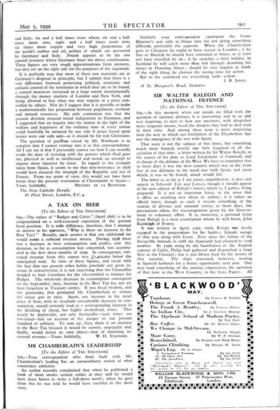A TAX ON BEER
[To the Editor of THE SPECTATOR] SIR,—The writer of " Budget and Crisis (April 28th) is to be congratulated on a well-reasoned exposition of the present fiscal position. It is with diffidence, therefore, that I attempt an answer to his question, " Why is there no increase in the Beer Tax? " Broadly, -such answer is that any additional tax would mean a reduced revenue return. During 1938 there was a decrease in beer consumption and profits, and this decrease, as far as consumption was concerned, was accentu- ated in the first three months of 1939. In consequence, esti- mated revenue from this source was £1,400,000 below the anticipated total. In view of these figures, and faced with the fact that our present sober habits preclude any great in- crease in consumption, it is not surprising that the Chancellor decided to look elsewhere for the wherewithal to balance his Budget. The wholesale decrease in consumption consequent on the September, 1931, increase in the Beer Tax has not yet been forgotten in Treasury circles. It was fiscal wisdom, and not generosity, that prompted Mr. Chamberlain to restore the status quo in 1933. Again, any increase in the retail price of beer, with its resultant considerable decrease in con- sumption, would certainly lead to a corresponding increase in the drinking of cheap, but highly alcoholised, wines. This would be deplorable, not only financially—such wines are low-taxed—but on account of the danger to our present standard of sobriety. To sum up, then, there is no increase in the Beer Tax because it would be unwise, unpopular and, finally, would defeat its own object—that of obtaining in- creased revenue.—Yours faithfully, W. H. STAFFORD.














































 Previous page
Previous page